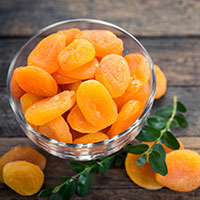| Mineral name |
Potassium |
| What’s it used for? | Key electrolyte for water balance, acid-base balance, muscle and nerve cell function, healthy heart, kidney and adrenal function |
| Best food sources | Most fruits and vegetables including avocados, bananas, tomatoes, potatoes and peaches, and cooked lima beans, corn, chicken and cod |
| How much do I need? | NRV is 2000 mg per day* |
| Need to know | It is essential that potassium is in the right balance to the other mineral salts (electrolytes), sodium and chloride |
*A Nutrient Reference Value or NRV is the recommended level set by the UK Department of Health for daily nutrient intake
Potassium
The mineral potassium is so intricately bound up with the other electrolytes, especially sodium, it’s almost impossible to discuss one without the other. Electrolytes are found in pairs; one with a positive charge and one with a negative charge; this is essential to create the right chemical reactions within the body. Whilst potassium is very widely available in many food sources, the typical western diet tends to be high in sodium causing an imbalanced ratio between the two minerals.
Why do I need it?
Potassium works in tandem with sodium in the functioning of muscle and nerve cells. Over 95% of potassium is found in the body’s cells with sodium being outside and connecting via a crucial sodium-potassium pump. This pump is in the membrane of all body cells and is needed to prevent cellular swelling. This may manifest itself as water retention but in severe cases, water accumulates in the cells and causes them to burst, which, thankfully is a very rare occurrence. The pump also functions to maintain the electrical charge within a cell which is key for muscle and nerve cell processes.
The sodium-potassium pump is also vital to numerous body functions, but potassium is needed for the conversion of blood sugar into glycogen for storage in the muscles and liver. If these levels are low then fatigue and muscle weakness will be felt, especially during exercise. Large amounts of potassium can also be lost during prolonged exercise, hence one of the reasons that bananas make a great pre- or post-workout snack.
Potassium is required to maintain blood pressure in the healthy range. Indeed, a diet low in potassium but high in sodium is frequently associated with high blood pressure.
Best food sources
Most fruits and vegetables provide good amounts of potassium. Interestingly, dried fruits contain higher levels than fresh.
Five foods high in Potassium

Dried apricots 1880 mg per 100g

Bananas 350 mg per 100g

Dried peaches 11000 mg per 100g

Avocado 400 mg per 100 g

Plums 260 mg per 100g
Are you getting enough?
True potassium deficiency is quite rare because of its wide availability in the daily diet. However, a diet that is low in fresh fruits and veggies but high in sodium (often in a processed diet), can cause a marginal deficiency. This is characterised by muscle weakness, fatigue, brain fog, palpitations, irritability and muscle disturbances. Excessive sweating or sickness and diarrhoea can often cause some of these symptoms due to depleted potassium levels.
Did you know?
A good sodium to potassium intake ratio should be around 5:1. Typical western diets are often round 1:2.The ratio of potassium to sodium in bananas is 440:1, another great reason for them being such a popular fruit
There is good research to suggest that potassium supplementation is a useful treatment in cases of high blood pressure, but you would need to consult your healthcare provider to discuss this further
People with kidney disorders are unable to handle potassium in the normal way so need to be on a low potassium diet under supervision from a healthcare specialist
It is best to try and avoid adding additional salt to cooking; there is sufficient found naturally in foods and this will help avoid the risk of creating imbalanced potassium levels
Try this
Potassium is found naturally in the fruit and vegetable blend of the Alive! range of multivitamins and minerals.
For more information visit www.feelaliveuk.com
You can also follow Alive! on Twitter for general health and wellbeing tips: @feelaliveuk



